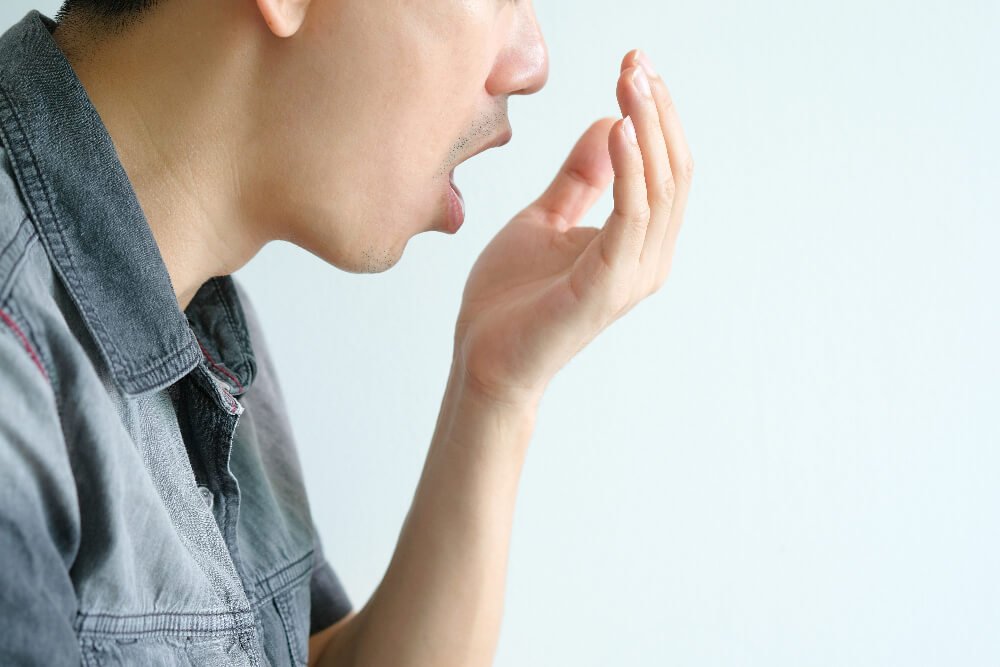We’ve all had stinky breath, also known as “halitosis.” But what causes bad breath, and how can it be prevented? In this blog from Palmetto Dental Associates, we’ll take a look at a few of the most common causes of bad breath, and discuss how you can take steps to freshen your breath and prevent halitosis.
1. Plaque And Tartar Buildup
If you’re not brushing and flossing properly, plaque builds up on your teeth. Plaque is a colorless, sticky film filled with bacteria that feeds on food particles in your mouth. Eventually, plaque can harden into tartar, which is usually yellow-brown and can make your teeth look stained.
Bacteria are smelly, and improper brushing and flossing also means that more food particles than usual are sticking around your mouth. In turn, this can contribute to bad breath, making your breath smell foul and unpleasant. Proper brushing and flossing will keep your teeth clean and help prevent bad breath and other oral health issues.
2. Cavities, Gum Disease, And Other Oral Health Problems
Bad breath can also indicate the presence of more serious oral health issues, such as cavities, infected teeth, and gum disease. Halitosis is especially common if you have gum disease, since bacteria-filled tartar will build up between your gum line and your teeth.
Brushing and flossing alone isn’t enough to resolve these issues. If you think you’ve got more serious oral health problems, you should see Dr. Thomas or Dr. Shull at Palmetto Dental Associates. They can provide you with the care you need to restore your oral health and eliminate halitosis, too.
3. Consuming Certain Foods Or Drinks
Some foods like garlic and onions are very potent, and even after they're digested and absorbed into your bloodstream, they can affect the smell of your breath. Some drinks can affect your breath, too. Sugary drinks provide food for bacteria, and alcohol and coffee tend to dry out your mouth, which can also promote bacteria growth. Cutting back on these foods or drinks, rinsing your mouth, and brushing your teeth and tongue after you eat and drink can help you fight back against bad breath.
4. Dry Mouth (Xerostomia)
Dry mouth can be caused by some medical conditions or medications, and dehydration can also contribute to dry mouth. If your mouth is not producing enough saliva, it can’t rinse away food particles and other debris effectively. This, in turn, leads to a buildup of bacteria, and can contribute to halitosis, too. Make sure you drink enough water, and talk to your dentist or your doctor if you think you have dry mouth.
5. Tobacco Use
All types of tobacco use can dry out your mouth and contribute to an unhealthy oral environment where bacteria can thrive. Cigars, cigarettes, and smokeless tobacco can also have strong smells that contribute to halitosis after you use them.
If you use any kind of tobacco, you should consider quitting. You’ll enjoy fresher breath, better oral health, and a much lower risk of oral cancer, lung cancer, and lots of other health complications.
Need Help With Bad Breath? Contact Palmetto Dental Associates in Lexington
Whether you’re struggling with halitosis or suspect you may have deeper oral health issues, our team is here to help in Lexington. Contact us online or give us a call at 803-808-0888 to schedule a consultation with Dr. Thomas or Dr. Shull. We’re always accepting new patients in Lexington and the surrounding areas, so get in touch today and take control of your oral health.

